Adbusters steps into shoe market
Adbusters, famous for its anti-consumption magazine and harsh criticism of athletic shoe companies, launched the Blackspot Sneaker earlier this month. In the process, it thrust a new anti-brand into the marketplace with the goal of snagging sales away from Nike, the Beaverton, Ore.-based shoe giant, often vilified for its labour practices and marketing techniques.
Drawing on the style of a vintage low-cut Chuck Taylor model, the Blackspot Sneaker features a black upper, woven from organic hemp grown in Romania, stitched to a white biodegradable rubber sole. Factory workers in Portugal hand paint the white Blackspot logo to each shoe and place a distinctive red tip on the toe for "kicking" (Nike co-founder) Phil Knight. "This Blackspot is really an attempt to create more diversity in the sneaker industry," says Kalle Lasn, editor-in-chief of Adbusters magazine.
"It’s about kicking Phil Knight in the ass for all the dirty deeds he’s done in the Third World." Besides occupying a place in the shoe market, Lasn anticipates like-minded entrepreneurs will brand a music label and restaurants with the Blackspot logo. "Our Blackspot stands for real empowerment," the Estonian-born founder of Adbusters says. "We want it to be a symbol of a fight for a better kind of business culture."
With each purchase, customers will receive one share in the new Blackspot Anti-Corporation, an entity established under the Adbusters Media Foundation. Shareholders will dictate how any profits get spent, but Lasn expects the money will go towards promoting causes like Buy Nothing Day.
Adbusters first floated the idea for an "ethical" sneaker on the back page of its anti-consumption magazine last September in the place of its usual spoof advertisement. An instant hit, readers pre-ordered over 10,000 pairs via the Internet. An estimated 250 independent stores will also retail the sneaker, which is priced at $47.50 per pair. Adbusters also launched a $250,000 advertising blitz earlier this week in support of its new brand.
"This is the best idea since Marxism," gushes one missive in the Ass-kickers’ forum on the Blackspot Sneaker’s website. "I'm glad to see Adbusters turn constructive. To watch you transform yourselves from producing gloom-and doom observations (albeit fascinating and informative ones) to a well-thought-out activist plan for the future is so cool," reads another.
While some rushed to buy the new sneaker, others in the anti-corporate movement disparage the concept, including author and columnist Naomi Klein. Without directly mentioning Adbusters, she told The Globe and Mail last fall, "Publications that analyze the commercialization of our lives have a responsibility to work to protect spaces where we aren't constantly being pitched to."
Lasn rebuffs the criticism, arguing it’s time to work for change within the capitalist system, which he acknowledges "isn’t about to disappear anytime soon.
"I think that those old lefties like Naomi Klein are afraid to think outside of their old lefty box. What have they done for the past 10 years? All they’ve done is complain and whine … they haven’t made a tad of difference. The Nike brand is still as cool as ever."
To differentiate the Blackspot Sneaker from its conventionally-produced counterparts, Adbusters out sources its manufacturing to a unionized-factory in rural Portugal. The factory owners pay their top workers $1,100 per month, provide free medical consultations on site and give 25 paid-vacation days per year. Working overtime is not compulsory. Adbusters produces and imports each pair of sneakers for $41. By contrast, producing a non-organic version of the sneaker in Asia would cost only $5.75.
North American unions pressured Adbusters to produce the shoe domestically, but Lasn insists the shoe be manufactured abroad to "spread the worker’s rights movement worldwide." The concept of an "ethical" sneaker fails to impress Johan Norberg, a Stockholm-based critic of the anti-corporate movement, who says Adbusters is "trying to come to terms with a problem that doesn’t really exist."
He points out in his book, In Defense of Global Capitalism, that multi-national companies like Nike and its ilk pay higher wages and obey the law more frequently in the Third World than their domestic counterparts.
"The best working conditions and the best wages are in those multi-national corporations in poor countries so that’s what we want more of if we want those countries to develop."
This article originally appeared in the Reflector.
16 September 2004
Subscribe to:
Posts (Atom)
